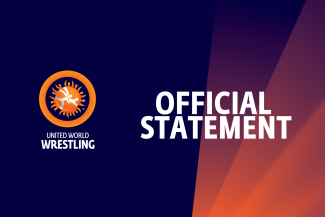Wrestling Returns with Individual World Cup in Belgrade, Dec. 12-18
Thursday, December 10, 2020 - 21:05 By United World Wrestling Press
BELGRADE, Serbia (December 10) -- The 2020 Individual World Cup gets underway Saturday in Belgrade, Serbia, with 505 wrestlers representing 51 different countries. Thirty weight categories in three styles will be contested over seven days of competition.
The Individual World Cup is serving as a substitute event for the 2020 World Championships. The event was canceled after not fulfilling the criteria set forth by the UWW Bureau. The criteria included having at least 8 of 10 of the top nations from the 2019 World Championships and 70% of total athletes participate in 2020.
The Individual World Cup represents international wrestling's return to competition and will lay the groundwork for safety protocols and countermeasures around all competitions. This will be vital to ensure a safe environment for future competitions in the lead up to the Tokyo Olympics.
The event has a prize pool of 300,000 Swiss Francs, which will be divided evenly across the 30 weight categories.
Thirty-one returning world medalists, including five returning world champions, are entered in the field.

Olympic champion Davor STEFANEK (SRB) will compete at 67kg (Photo: Gabor MARTIN, United World Wrestling)
The Individual World Cup opens Saturday with Greco-Roman competition, which will be headlined by four Rio Olympic champions: Artur ALEKSANYAN (ARM) at 97kg, Davit CHAKVETADZE (RUS) at 87kg, Davor STEFANEK (SRB) at 67kg and Roman VLASOV (RUS) at 77kg.
The Greco-Roman 97kg weight category, which will be contested Sunday and Monday, is one of the most intriguing weight categories in the entire event. It includes Aleksanyan, returning world champion Musa EVLOEV (RUS) and multiple-time world medalist Mihail KAJAIA (SRB).
Aleksanyan and Evloev have one of the sport's greatest rivalries. The two Greco-Roman stars have combined to win gold medals in every world championship or Olympic Games since 2014. Kajaia, who will be competing in his home country, won bronze medals at the last two world championships.
On Sunday, Stepan MARYANYAN (RUS), a 2018 world champion and multiple-time world medalist at 63 kg, will make his 60kg debut. Maryanyan defeated 60kg world champion Sergey EMELIN (RUS) at the Russian Cup.

Aisuulu TYNYBEKOVA (KGZ) became Kyrgyzstan's first world champion (Photo: Gabor MARTIN, United World Wrestling)
The women's wrestling competition will be held Monday through Wednesday. Returning world champion Aisuulu TYNYBEKOVA (KGZ) will compete at 62kg on Monday. Tynybekova earned a place in Kyrgyzstan's sporting history in 2019 as the first wrestler to win a senior world title when she claimed the women's 62kg gold medal with a 5-3 win over defending champion Taybe YUSEIN (BUL) at the World Championships. Tynybekova's road to the title next week could go through 2019 world silver medalist Liubov OVCHAROVA, who is also entered at 62kg. Ovcharova is ranked No.2 in the world at 59kg.
The 50kg weight category in women's wrestling includes a pair of returning world medalists, Emilia VUC (ROU) and Ekaterina POLESHCHUK (RUS). Vuc, ranked No.1 in the world, finished as a runner-up to Mariya STADNIK (AZE) at the 2019 World Championships in Nur-Sultan. In 2020, she earned a silver at the Matteo Pellicone in Rome and finished seventh at the European Championships. Poleshchuk won a bronze medal in Nur-Sultan.

Olympic champion Erica WIEBE (CAN) is a top contender at 76kg (Photo: Tony Rotundo, United World Wrestling)
Olympic champion Erica WIEBE (CAN) is entered at 76kg. She will compete in a field that includes 2017 world champion Yasemin ADAR (TUR), returning world bronze medalist Aline FOCKEN (GER), and multiple-time world medalist Ekaterina BUKINA (RUS), among others.
Three returning world champions from Russia are entered in the freestyle competition, which begins Wednesday. Those Russian world champs include Zavur UGUEV (57kg), Gadzhimurad RASHIDOV (65kg) and Abdulrashid SADULAEV (97kg).
Uguev, a two-time world champion, will compete in a 57kg field that includes returning world bronze medalist Kumar RAVI (IND). Uguev and Ravi met in the world championship semifinals last year, with Uguev winning 6-4. Ravi added a gold medal at the 2020 Asian Championships.

Gadzhimurad RASHIDOV (65kg) is one of three returning freestyle world champs competing for Russia (Photo: Kadir CALISKAN, United World Wrestling)
Rashidov, a world champion and two-time world silver medalist, will have to navigate a 65kg field that includes three-time world champion Haji ALIYEV (AZE) and returning world bronze medalist Iszmail MUSZUKAJEV (HUN).
Sadulaev, the Rio Olympic champion and four-time world champion, will face a 97kg field that includes returning world bronze medalist Magomedgadji NUROV (MKD) and U23 world champion Shamil ZUBAIROV (AZE).

Two-time world champion Frank CHAMIZO (ITA) is entered at 74kg (Photo: Tony Rotundo, United World Wrestling)
Frank CHAMIZO (ITA), one of the sport's biggest stars, is entered at 74kg. Chamizo, a two-time world champion and Olympic bronze medalist, could see competition from Razambek ZHAMALOV (RUS), a U23 world champion and Ivan Yarygin Grand Prix silver medalist.
The Individual World Cup begins Saturday at 11:00 local time, with Greco-Roman qualification rounds at 55 kg, 67kg, 72kg, 77kg and 87kg.
Schedule
Saturday, December 12
11.00-15.00 Qualification rounds GR – 55-67-72-77-87kg
18.00-19.30 Semifinals GR – 55-67-72-77-87kg
Sunday, December 13
11.00-15.00 Qualification rounds GR – 60-63-82-97-130kg
11.00-15.00 Repechage GR – 55-67-72-77-87kg
17.30-17.45 Opening Ceremony
18.00-18.45 Semifinals GR – 60-63-82-97-130kg
19.00-22.00 Finals GR – 55-67-72-77-87kg
Monday, December 14
11.00-14.00 Qualification rounds WW – 50-53-55-62-72kg
11.00-14.00 Repechage GR – 60-63-82-97-130kg
17.00-17.45 Semifinals WW – 50-53-55-62-72kg
18.00-20.30 Finals GR – 60-63-82-97-130kg
Tuesday, December 15
11.00-14.00 Qualification rounds WW – 57-59-65-68-76kg
11.00-14.00 Repechage WW – 50-53-55-62-72kg
16.45-17.45 Semifinals WW – 57-59-65-68-76kg
18.00-20.30 Finals WW – 50-53-55-62-72kg
Wednesday, December 16
11.00-15.00 Qualification rounds FS – 57-70-74-92-125kg
11.00-15.00 Repechage WW – 57-59-65-68-76kg
16.45-17.45 Semifinals FS – 57-70-74-92-125kg
18.00-21.00 Finals WW – 57-59-65-68-76kg
Thursday, December 17
11.00-15.00 Qualification rounds FS – 61-65-79-86-97kg
11.00-15.00 Repechage FS – 57-70-74-92-125kg
16.45-17.45 Semifinals FS – 61-65-79-86-97kg
18.00-21.00 Finals FS – 57-70-74-92-125kg
Friday, December 18
15.30-17.30 Repechage FS – 61-65-79-86-97kg
18.00-21.00 Finals FS – 61-65-79-86-97kg


Share your thoughts.
Comments